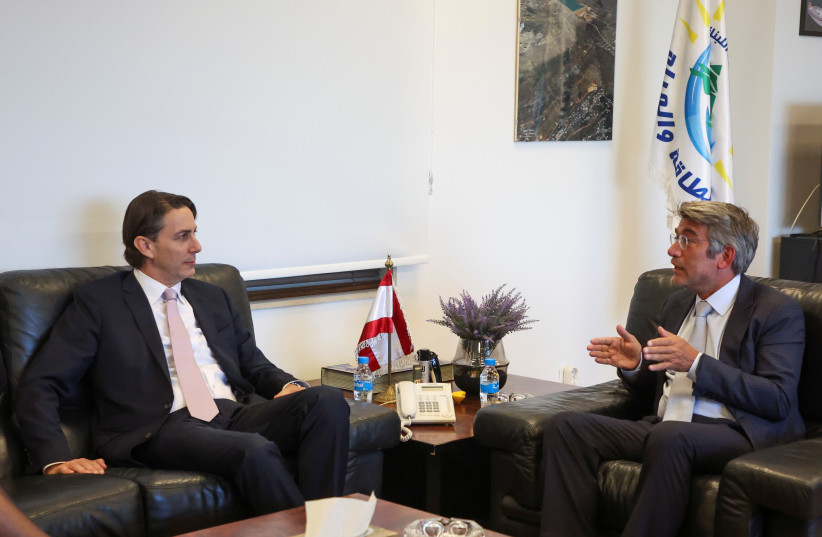
On Friday, in advance of Hochstein’s visit, the Lebanese Foreign Minister expressed optimism that an agreement over the long-simmering dispute could be reached,
By HERB KEINON
Lebanon’s utter dysfunctionality came into clear view over the last 48 hours just in time for the arrival in Beirut on Sunday of US negotiator Amos Hochstein, who is hoping to negotiate an agreement between Israel and Lebanon regarding their disputed maritime border.
This is a multi-billion dollar question, as rich natural gas fields lie under the seabed in the overlapping areas that both countries claim as their own.
On Friday, in advance of Hochstein’s visit, no less a personage than Lebanese Foreign Minister Abdallah Bou Habib expressed optimism that an agreement over the long-simmering dispute could be reached.
Lebanon’s Foreign Ministry account tweeted that Bou Habib, in a BBC interview, stated that “there has never been optimism to the extent that there is today.”
If Hochstein could get the sides to agree on a maritime border, then Israel could drill from the Karish site unimpeded, and Lebanon would have access to the Qana field that it claims is in its territorial waters. Such an agreement would benefit both countries: Israel could export more gas, and Lebanon could go a long way toward solving its chronic electricity problems.

US Senior Advisor for Energy Security Amos Hochstein shakes hands with Lebanese Foreign Minister Abdallah Bou Habib, in Beirut, Lebanon June 14, 2022. (credit: REUTERS/MOHAMED AZAKIR)
Furthermore, a thorny dispute that has intermittently been used as a possible casus belli would be disabled.
Good news, right?
Wrong.
Some 48 hours after the Lebanese Foreign Ministry tweeted its optimism about a possible deal, Hezbollah took to social media on its own and uploaded a threatening video message to Israel showing that the Karish site, the rig that just moved into place there, and the barges that service the rig are all well within the range of Hezbollah missiles.
The terrorist organization’s menacing message was clear: If Israel starts to extract gas as it plans to next month, Hezbollah will strike at the site.
So what is it? Is the mood in Beirut one of optimism, or doom? Or, in the words of the classic US television game show To Tell the Truth: Will the real Lebanon please stand up?
Who speaks for the country? The Foreign Ministry, which is the case in most normal and functioning countries, or Hezbollah? Is Lebanon looking to negotiate an agreement with Israel, or fight a war against it?
And therein lies the dilemma for Israeli policymakers. Who to believe? The Lebanese government or the Iranian-backed terrorist organization that has a massive hand in running the country.
The best option seems to be to believe both.
The Lebanese government wants a deal with Israel because the country is quickly sinking into an economic morass that it will be difficult to recover from, and the Americans are keen on brokering that deal, wanting to do something that puts Lebanon on a more positive trajectory.
Hezbollah, on the other hand, is in a weak domestic position in Lebanon, as more and more Lebanese are blaming it – and its umbilical connection with Iran – for the country’s never-ending woes. In that situation, Hezbollah may be willing to engage in military adventurism to recover some of its fallen prestige.
Hezbollah’s head Hassan Nasrallah has in the past threatened Israel – a lot. For years he has said that Hezbollah has missiles that could reach every square meter of Israeli territory.
He has threatened to attack the power station in Hadera and send Israel into six months of darkness; he has threatened to conquer the Galilee; to attack Ben-Gurion Airport and – after the killing of No. 2 Imad Mughniyeh in 2008 – he threatened to destroy Tel Aviv.
In 2016, Nasrallah said he would attack an ammonia storage facility in Haifa, thereby incinerating much of the North.
And now he is threatening to fire missiles at the Karish gas rig.
After hearing so many of these threats over the years, the first instinct might be to simply dismiss them and conclude that Nasrallah is all talk.
The only problem is that he has proven that he is not always all talk.
In the months leading up to the Second Lebanon War in 2006, Nasrallah threatened to kidnap IDF soldiers to exchange for Lebanese held by Israel, including Samir Kuntar, who carried out a brutal terrorist attack in Nahariya in 1979. He acted on that threat, killing three soldiers, wounding two and capturing Ehud Goldwasser and Eldad Regev in July 2006 in an action that led to the Second Lebanon War.
It’s difficult, if not impossible, to know when Nasrallah is just shooting off his mouth, or when those threats should be taken seriously. Over the last few weeks, the impression in Jerusalem is that the threats this time deserve to be taken more seriously than in the immediate past.
Why? Why take these threats more seriously, than, say, six years ago? Precisely because Nasrallah has something to prove. With Lebanon in the doldrums, and many Lebanese blaming the country’s dire political and economic situation on Hezbollah, Nasrallah needs to show the Lebanese that he remains the great defender of Lebanon and Lebanese interests from the Israelis. If he launches a missile at the Karish rig, this can be sold to the Lebanese as sticking up proudly and forcefully for Lebanon’s rights.
The interests of Iran, which to a large degree controls Hezbollah, must also be factored in. Tehran is desperate to bloody Israel’s nose, after a spate of attacks inside Iran attributed in the foreign media to Israel. In addition, it is also very keen on entering a new nuclear agreement with the US and having the sanctions slapped on it removed. Activating Hezbollah against Israel at this time could be a signal to the world of the type of damage Iran could unleash if its conditions for re-entering a new nuclear deal are not met.
But there was also something very feeble in Hezbollah’s video threat against Karish.
For a generation, Hezbollah has had missiles capable of reaching every inch of Israeli territory. And they have a lot of them, with the estimates varying from 130,000 to 150,000. They didn’t just get these missiles yesterday. But, since the Second Lebanon War in 2006, they have not used them. Not because they wouldn’t like to wreak as much havoc, death and destruction on the Jewish state as possible, but because they realize that if they fire rockets, they will be hit hard in return.
Hezbollah’s release of this video was obviously a ploy in psychological warfare: to strike fear into the hearts of Israelis.
But the same Nasrallah – who in 2000 with the withdrawal of the IDF from Lebanon brayed that Israel was fat and sassy and void of fight and purpose, like a “spider web” that could be easily blown away – knows that if he dares fire at the Karish rig, he will unleash hell on Lebanon.
It’s not as if Hezbollah will fire on Karish and Israel will pack up and say, “Oh well, Karish was a bad idea.” Israel would retaliate with great force. Hezbollah can inflict a great deal of pain on Israel, but Israel can inflict even more on Hezbollah and Lebanon.
That is the deterrence that has kept Nasrallah from actually acting on any of his many threats against Israel in the past. And that is the same level of deterrence likely to prevent him from doing the same today.
Likely, but not 100%, And it is that margin of error that is undoubtedly keeping the IDF senior brass up at night. The rest of the country, however, need not panic because Hezbollah releases a threatening video. Anything Nasrallah throws at Israel can be thrown back many times over.
This is why this video may be something else entirely, and that is a public relations stunt aimed not at Israelis, but the Lebanese.
If indeed Hochstein can mediate an agreement between Israel and Lebanon, and it is an agreement in which Israel makes some concessions on the Qana field, Nasrallah will try to take credit, saying it was his organization’s threats that led to these concessions.
In that scenario, the interests of Israel, the US and the Lebanese government will coincide: to make clear that Hezbollah’s bluster and threats had nothing to do with it at all.
Source: https://www.jpost.com/middle-east/article-713578

.png)
